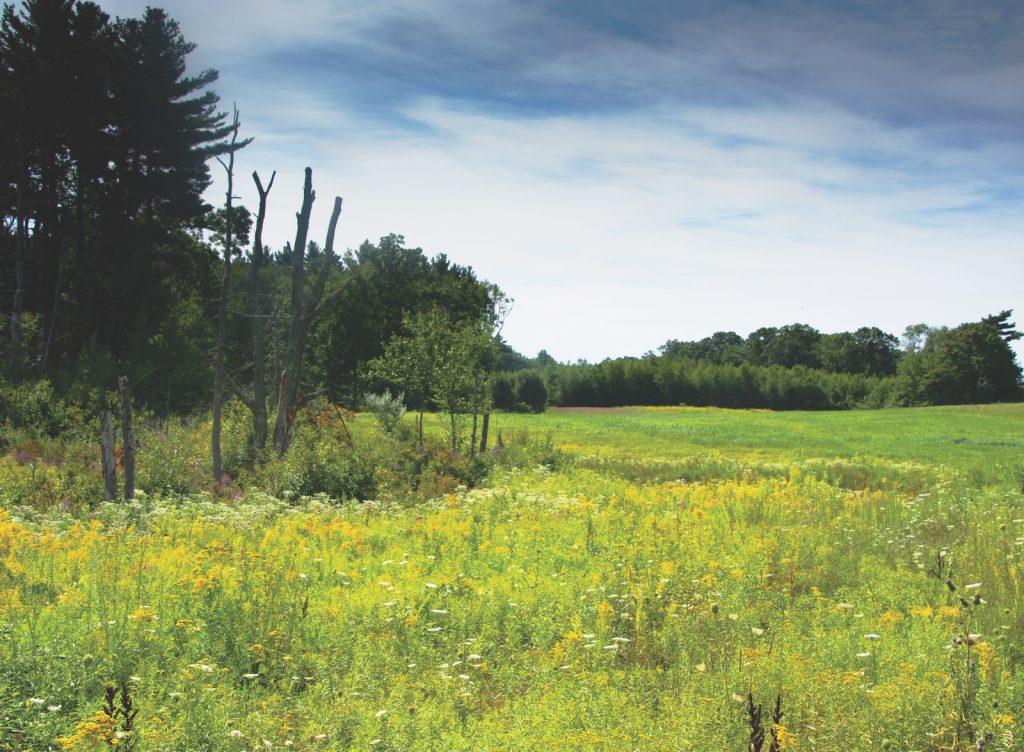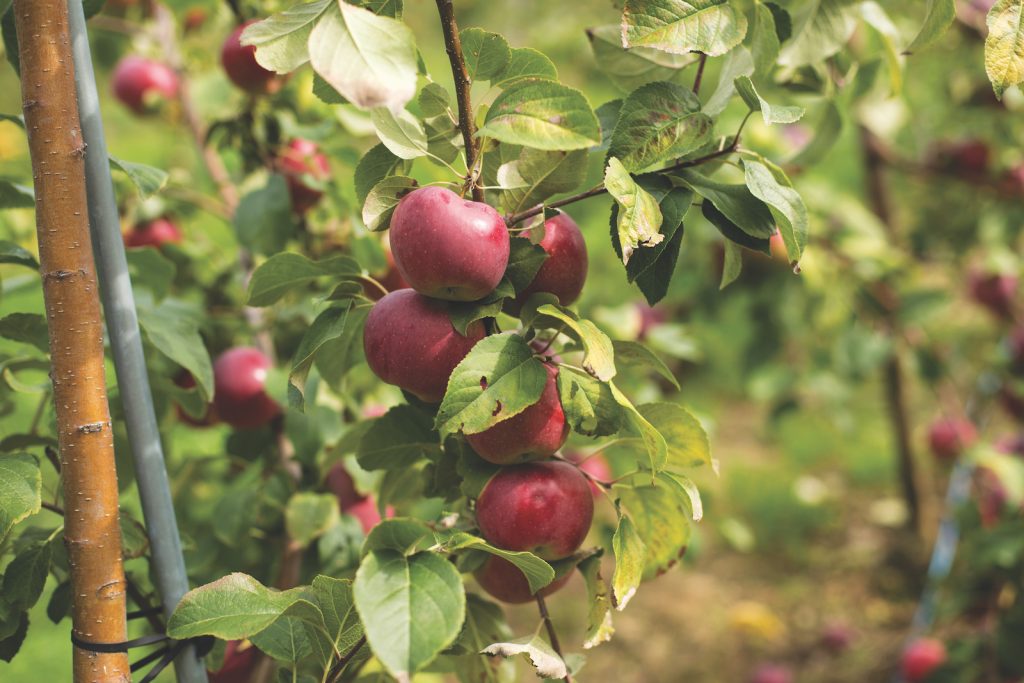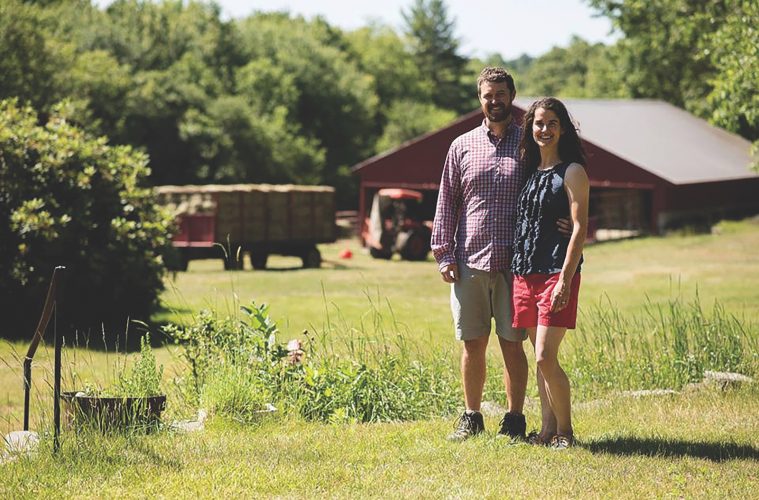Don Cox loves his life on Old Wild Farm in Haverhill. There he and his wife, Laura Scholten, work the land and are raising their new baby, who was born on New Year’s Eve 2017. The 97-acre piece of land has been a working farm since 1706, so when Cox’s great aunt died with no heirs, she left the land to his mother and her family, with the condition that it remain a farm.
At just 23 years old, living in his native Oklahoma and “pretty fresh out of college,” Cox says he found himself being asked whether he was interested in farming in Massachusetts. “I didn’t know if I wanted that life, but my adventurous side said yes, and I’m so glad I did.”
Cox says as long as he’s there, the land will remain a farm, but that doesn’t mean there isn’t constant pressure from outside. “We’ve had developers after us asking us four times this winter to sell our land,” he says. He’s refused. “All I want is to keep it a farm. As long as I’m out here, it won’t be developed,” Cox states.
-1024x683.jpeg)
Small family farms are as much a part of the North Shore’s distinct landscape as its rolling sand dunes on the coast and antique brick mill buildings in the cities. But rising land values and an ever-present pressure for new housing threaten those farms every day, and farmers whose families have been living and working on that land for generations are often faced with impossible choices about whether to sell or stay.
That’s why it’s such big news that Greenbelt, which is Essex County’s Land Trust, and five other partner organizations have been awarded $1,050,000 through the Regional Conservation Partnership Program of the USDA’s Natural Resources Conservation Service. The award will provide Greenbelt with seed funding to permanently protect working farms in the Merrimack Valley.
“The Merrimack Valley is a very special place to farm due to our proximity to the ocean, which creates a micro climate that is very beneficial to crop growing, with its moderating effect on temperature,” says Glenn Cook, who co-owns Cider Hill Farm in Amesbury with his wife, Karen.
Moreover, saving Merrimack Valley farms helps to protect the region’s food security, local economy, ties to history, and unique landscape, as well as its clean air, drinking water, and natural habitats.
The new funding will help Greenbelt acquire conservation easements (called “conservation restrictions” in Massachusetts) on working farms, which are voluntary agreements that allow landowners to continue to own their property while placing permanent restrictions on developing the land. “It permanently ensures that that land is forever available for farming,” says Vanessa Johnson-Hall, Greenbelt’s assistant director of land conservation.
Today, Cox owns and operates Old Wild Farm with Laura, while also working full-time as a registered nurse. His parents are trustees of the land itself. Old Wild Farm operates as a homestead and farm; whatever they aren’t eating or using themselves, they sell at the Haverhill Farmers’ Market. Their products include hay, vegetables, fruit, wool, and sustainably forested wood, as well as pecans harvested from Cox’s parents’ 500-acre farm in Oklahoma.

Leonhard & Eldred Farm in North Andover is just one of the farms in the Merrimack Valley that the seed funding is helping to protect.
Cox is hardly alone in being hounded by developers for his farmland. “Because farmland is open, cleared, and generally on a rolling kind of landscape, it’s a prime target for development because not a lot of additional funds have to go into clearing for roads and infrastructure,” says Mary Williamson, director of development and community engagement for Greenbelt.
However, many farmers—even those who would rather not—wind up selling their land. According to Greenbelt’s project partner Land for Good, more than one-third of Massachusetts farmland is owned by farmers age 65 and older—in other words, retirement age. “The majority of the farmers I talk to hate the idea of seeing their land converted to housing,” Johnson-Hall says. “I think it’s more often something they feel they have to do or want to do to provide for their heirs.”
In addition, farmers often don’t have any identified successor for the farm. Data from Land for Good show that 90 percent of these retiring farmers don’t have a young farmer lined up to take over. In fact, 30 percent of Massachusetts farmers are likely to exit farming in the next decade, according to Land for Good.
The easements take some of the financial burden off farmers who would rather not sell their land. “These development rights have value…. You’re compensating the farmer for at least some of the value of those development rights,” says Johnson-Hall. “The land is still theirs; it just can never be subdivided and developed.”
The easements can also include a provision that ensures that if the land is sold in the future, it must be sold at agricultural value. “It helps keep the land affordable for future farmers to buy,” Johnson-Hall says.
Although most of the money from the award will be used for acquiring agricultural land easements, the partner organizations will also host educational workshops for young and senior farmers on topics like business planning, buying and leasing farmland, and succession planning.
 ?
?
Cider Hill Farm in Amesbury.
The partnership will also help to facilitate conversations between these farmers regarding land leasing and succession planning, since young farmers face incredible hurdles, the biggest of which is the price of buying land. Unless someone has inherited family land, it’s hard to find affordable land to farm. That’s why young farmers often lease on existing farmland. “We’re hoping, through this, to be able to facilitate those connections,” Johnson-Hall says.
For someone like Cox, the program holds a lot of promise, but it has potential downsides, too. “That would mean some cash inflow that could be used to invest in the farm,” he says. On the other hand, restrictions that accompany the program would limit how he and his family would be able to build on and use the land in the future.
Cook echoes Cox, saying that he hopes the organizations involved “continue to develop creative programs that partner with other land conservation programs that pay to place limited conservation easements on participating farms that are very farm-friendly and do not unnecessarily tie the hands of future generations that may want to farm.”
Already, the project partners have identified several thousand acres of unprotected farmland in 10 towns that are included in the award: Salisbury, Amesbury, Merrimack, Haverhill, Groveland, West Newbury, Newbury, Newburyport, Boxford, and North Andover. Johnson-Hall says it’s critical to save this part of our heritage, landscape, and culture, as well as help preserve the livelihoods of our local farmers.
“People farm because they love it,” she says. “They love the land, they love working the land; they know the land better than any of us ever will.”

